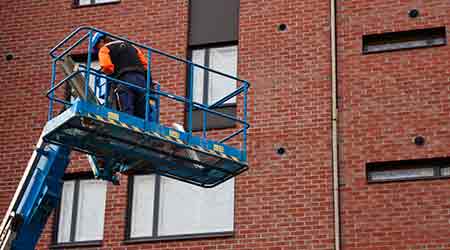Special Report: Paving a Smooth Path to Equipment Rental Success
Part 1 of a 3 part article on successful rental experiences
Rental equipment has become a mainstay of maintenance and engineering departments in institutional and commercial facilities looking to supplement equipment arsenals with specialized power tools, aerial work platforms, and construction equipment, to name just a few rental options.
The equipment enables front-line technicians to complete difficult or time-sensitive tasks and projects more safely and efficiently. But the path to completing projects sometimes results in mistakes by rental companies and managers, often delaying projects and threatening budgets.
Pre-planning pointers
A challenge for managers is to understand potential rental process problems in advance and take steps to avoid them. The process includes a number of key steps, including understanding the finer points of a rental contract before signing it, inspecting rented equipment to ensure everything works properly and technicians understand how to operate it, and steps to take should something go wrong during the rental period. The first suggestion is to get everything down in writing.
“You really have to dot your i’s and cross your t’s when you talk to” equipment rental companies, says Paul Gallerani, facility supervisor for Day Kimball Healthcare in Putnam, Conn. “They want the sale, but once the machine is on site, they’ve got you. I can call up and rent a generator, and it’s a flat fee. The next thing you know, I’m getting an invoice for a round-trip fee, loading fee, reloading fee, (and) start-up fee, and I’m thinking ‘That was included in the price you gave me over the phone.’ ”
Managers also suggest making rental companies consider operator training a priority.
“Anytime you are renting specialty equipment, you should be more vigilant in the planning process,” says Neal DiChiara, director of facilities maintenance at the University of Alabama. “The learning curve is usually greater, so extra preparation to include equipment operation training should be considered.
“We had a remote control compacting machine here. The remote control worked OK when the rep dropped it off, but a couple of hours later it was not working OK. With the special equipment, we could have used more training. We eventually got it, and they made it right, but it cost us time.”
Shopping around for a rental company also is an important step. When a chiller failed, Day Kimball looked for companies that could provide assistance quickly and found a lesser-known company that could provide assistance faster than a higher-profile company could. The well-known company could fulfill the request in three to four days, while the lesser-known company needed only 10 hours.
“I personally made the mistake,” says Greg Harubin, the hospital’s director of facilities management, who eventually chose the lower-profile company. “I got a big name, and they were the one that colleagues said I should call. But I guess maybe some of my colleagues didn’t beat the bushes and didn’t find out that there are others out there who are aggressive and can provide a better service.”
Related Topics:










